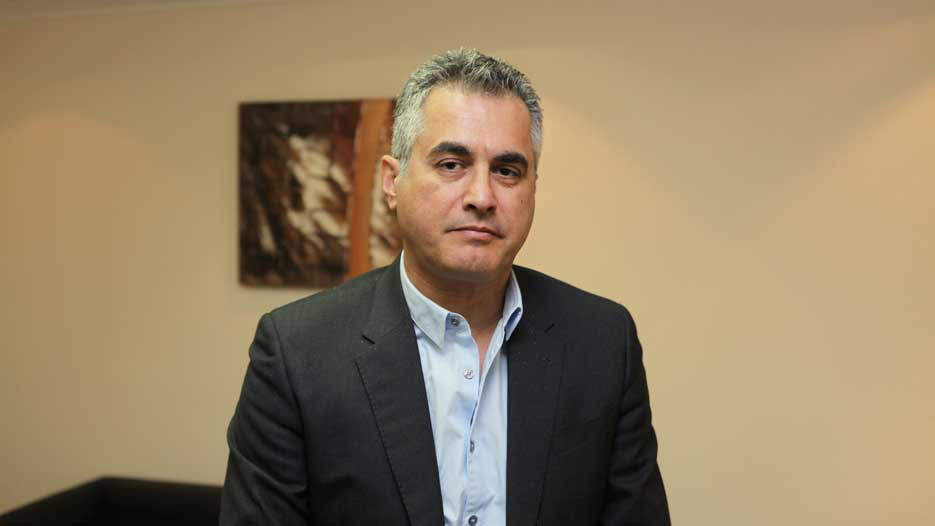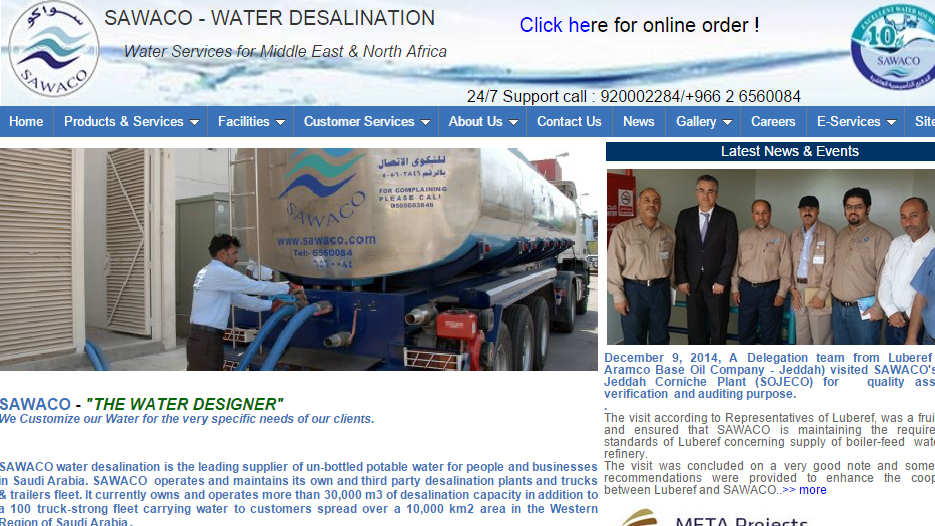Desalination market worth SAR 70 bn over the next 5 years
The figures can be deceiving. You might hear figures like 300 or 400 billion. Desalination is a very tough business that requires a lot of engineering. Even if you have resources, you have what are called ‘technical capacity limitations’ and you need to do an environmental impact study. So there are other factors that dictate the uncontrolled expansion of the desalination market. Several issues need to be taken into consideration including environmental impact, engineering capabilities, the availability of first class EPC contractors etc.
Interview with Nizar Kammourie, General Manager of Sawaco Water Desalination

What is the overall sentiment in the desalination and waste water treatment market and how big is the market?
The desalination market in Saudi Arabia is an ever increasing market due to the very limited renewable resources of water available, whether it is runoff of rainwater or the aquifer. Desalination is one of the main sources of domestic water for personal use in Saudi Arabia. The government has no choice but to desalinate seawater to provide water in its major cities. I’m sure you are aware there are private operators in Saudi Arabia but bulk quantities are designed and operated by the government, through its agency SWCC (Saline Water Conversion Corporation). I think the total market for desalination alone, over the next 5 years, will be about 70 billion Saudi Riyals. This includes the installation of new capacity and the maintaining and running of existing facilities.
The figures can be deceiving. You might hear figures like 300 or 400 billion. Desalination is a very tough business that requires a lot of engineering. Even if you have resources, you have what are called ‘technical capacity limitations’ and you need to do an environmental impact study. So there are other factors that dictate the uncontrolled expansion of the desalination market. Several issues need to be taken into consideration including environmental impact, engineering capabilities, the availability of first class EPC contractors etc.
I put the market over the next 5 years at SAR 70 billion.
When you move to waste water treatment, it’s a different ballgame. Saudi Arabia still lags in treating all its waste water streams, both industrial and municipal. Industrial waste streams have now largely been tackled and taken care of by a governmental agency called MODON. MODON is the agency that develops industrial parks. In every industrial park they develop, they have their own waste water treatment plant, both industrial and municipal. They also have a treatment plant for water for drinking water and irrigation. In addition, water re-use is becoming very big. When we talk of the size of the waste water treatment industry, we must also factor re-use into the equation. On the municipal side, the government has multiple agencies involved in this. Some of the agencies are the National Water Company and the Directorate of Water of Saudi Arabia. They have their own budgets for waste water treatment and waste water networks. It’s safe to say that overall, over the next 5 years, the volume will be between SAR 35 to 40 billion.
So between desalination and waste water treatment, I would put the market size over the next 5 years at about SAR 110 billion. This is our company assessment and it might differ tremendously from other sources.
You are one of the companies offering all these services. What is the current value of all the projects you are undertaking? What is you market position?
The Water Division at Saudi Brothers Group is made up of several companies. One of them is Sawaco, the desalination utility. The other one is Suido Kiko Middle East, which is a Saudi-Japanese joint venture in the EPC market of water and waste water treatment plants. We have a third company, which is Chemsbro, a chemical services company. Sawaco currently has 30,000 cubic meters of capacity under management. Over the next 6 months we will have another 6500 cubic meters in our capacity. Overall investment in desalination capacity is well in excess of SAR 400 million. We not only do desalination but we also add buildings, networks and distribution fleet. We de-salt and we transport water.
If you look at Suido Kiko Middle East, it’s an EPC company. So it relies largely on government contracts. Almost 98% of our income is derived from government contracts. Here we are in the SAR 500 to 600 million worth of projects, in hand to execute.
Can you give us a brief overview of your parent company? What are the advantages you derive from being part of this group?
We are a part of the Saudi Brothers Commercial group. The Saudi Brothers Commercial Group has been around for over 40 years. It has an excellent financial reputation with the banks. It’s a very strong and sound group. It has businesses in 11 different sectors, among them are water, the food industry, entertainment, aviation, manufacturing, precision engineering, marinas etc. In addition, Saudi Brothers group is an active investor in other major factories in Saudi Arabia, in food and manufacturing. It also has a big presence in the chemical industry.
To be part of this group means we can leverage the financial strength of the group. It comes in very handy when we are trying to seek facilities, business relationships and networking opportunities. It is good to be an established under the umbrella of the Saudi Brothers group. It has many advantages in terms of access to finance, access to a network of companies and individuals and of course, and a formidable network with governmental agencies which is essential for doing business in Saudi Arabia. Being part of this group and leveraging its strengths gives us a natural advantage over our competitors. But you have to know how to leverage the various strong points of the group.

You are one of the two companies with special technology, membrane technology, in partnership with the Japanese company. What makes you stand out in the market? What sort of innovation are you bringing to the market?
When we decided to enter the EPC field of waste water treatment, the idea was to bring an added-value to the market. We were not only interested in treating waste streams, but we also wanted to look at waste as a resource. When we started Suido Kiko Middle East, Membrane Bio Reactor (MBR) technology was very new. Our Japanese partners were the leaders in developing the technology. We saw that it could have many applications to it. We started the joint venture with the hope of creating alternative sources of water, using membrane technology that could be used in irrigation, construction and other areas.
This could reduce the stress on the desalination plants the government was running.
It costs about SAR 2.5 to 3 to produce a cubic meter of desalinated water even under a very efficient production process.
But creating a cubic meter of re-used water, of almost identical quality, using MBR technology, costs less than 1 Riyal to produce. You can see the price advantage. It’s not just about price either. We are creating a new resource for water that this country badly needs. Imagine if you use MBR produced water in the building industry, for irrigation, for flushing toilets, we will save so much on the installed capacity of desalination plants.
That’s what we brought in when we created the joint venture. I say humbly, we succeeded in getting government approval for this project when much bigger companies had tried and failed. It was due to our diligence that the government of Saudi Arabia approved MBR technology. Since 2007 we have executed more than 25 projects across the kingdom, in Tabuk, Najran, Riyadh etc. Wherever you go you will find MBR plants built by Suido Kiko Middle East, turning waste water into re-use grade water. We had a vision and we achieved it.
In terms of your market position, you are now number one in construction.
No we are not the largest company per se but we have secured the largest number of projects using MBR technology in Saudi Arabia. Today, we have projects in Abha, Jizan, Dammam, Khobar. All of them use MBR technology. Put it all together and we have the largest volume of MBR projects for waste water treatment in Saudi Arabia. In general though, there are a lot of competitors for Suido Kiko Middle East. We compete with many OEMs and with contractors who align themselves with OEMs (original equipment manufacturers).
Are these companies using different technologies?
MBR technology is not restricted to Suido Kiko . Any company with engineering capabilities can have access to MBR technology. It’s an open technology. You have the flat sheet and the hollow fiber. It’s not restricted to one or two companies anymore.
One of the challenges for Saudi Arabia is that people are wasting water. They do not harvest water. They are profligate users of water. Do you see this as a big challenge? And what should be done to address it?
The issue with water users in Saudi Arabia is they do not conserve water simply because it is too cheap. People don’t pay for water and if they do, they pay marginal amounts. It doesn’t even cover the cost of production. There is no incentive for people to stop squandering water. If you think about , water is very expensive in Saudi Arabia. It comes mainly from desalination. Desalination means you have to run huge pumps and boilers. This requires crude oil. The government burns crude to provide water. So when people squander water they squander the wealth of the country. There will come a time when it will not be sustainable to consume and squander water at this rate. Sooner or later, the government will have no choice but to raise the price of water to stop people from squandering water, to save on consumption. Per capita water consumption in Saudi Arabia is among the highest in the world, although Saudi Arabia has very minimal renewable water resources. The pattern of water consumption behavior you see today is not sustainable. It can’t continue forever. First, it will deplete the country’s riches because you’re really burning oil to produce water. Second, there will not be enough water for future generations. I think, in the near future, the government will have no choice but to raise the water tariff.
How developed do you think the sewage facilities in Saudi Arabia are compared to the developed countries in the west?
In the last 10 years, Saudi Arabia has been on a massive capital investment program. It has been a very generous spending spree to put in, develop and operate the infrastructure of waste water at the highest international standards. A lot has been done, but a lot needs to be done. If you compare a city like Jeddah to cities like Tokyo, there’s a long way to go. But cities like Jeddah and Riyadh are already putting in place a world class sewage infrastructure. We have sewage tunnels, state of the art sea outfalls, state of the art waste water treatment plants. The government is investing but the task is huge and the work has only begun recently. They need some time to catch up. It’s a big challenge but they have started on it. There have been a lot of successes but there is still a lot to be done.